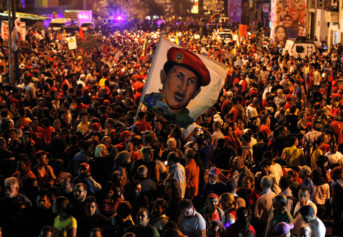Venezuelan President Hugo Chavez easily swept to victory yesterday, beating challenger Henrique Capriles by 9 points in an election that will give him six more years to taunt Washington with his anti-United States rhetoric while Venezuelan oil continues to flow to the oil-hungry U.S.
There were lusty celebrations in the streets by Chavez supporters, gleeful that they will have another term under the leadership of the charismatic but polarizing leader who first rose to power in 1999 and who has used the nation’s oil riches to provide free health clinics, government housing and generous pensions to the poor. Chavez, who survived a bout with pelvic cancer over the past year, vowed that he would be a better president during his next term.
“Today we start a new cycle of government, in which we must respond with greater efficacy and efficiency to the needs of our people,” he said. “I promise you I’ll be a better president.”
According to Reuters, Chavez trumpeted the seemingly smooth democratic process by which the country voted yesterday. The Socialist leader has been accused by his opponents of using strong-arm tactics to intimidate voters into casting a ballot for him.
“This has been the perfect battle, a democratic battle,” Chavez said late on Sunday, speaking from the balcony of the palace, where he held up a replica of the sword of independence hero Simon Bolivar—never letting pass a chance for dramatic gestures.
“Venezuela will continue along the path of democratic and Bolivarian socialism of the 21st century,” he said.
Chavez won 54.4 percent of the vote, compared to 45 percent for Capriles.
While the Chavez regime accused Capriles of running a U.S. style marketing campaign for president, Capriles tried to use crime to attack Chavez, saying the country’s high murder rate—50 homicides per 100,000 inhabitants in 2011—was evidence of the president’s poor handling of the country’s crime wave. As if to illustrate his point, violence broke out last weekend at an opposition rally planned in Barinas, Chavez’s home state. When the road was blocked by government supporters, three men got out of their car’s to get through, but they were fired on by gunmen inside the van. The three of them died from their wounds.
According to Reuters, turnout was a record 80 percent of registered voters, which offered a major boost to Chavez’s democratic credentials despite the accusations of dictator-like voter intimidation.
“He will keep protecting the poor, the defenseless and the old,” teacher Gladys Montijo, 54, weeping with joy, said at a rally of Chavez supporters.
Housewife Teresa Perez, 51, a Capriles supporter, said, “We are all hurt and sad but not disappointed. It was an incredible campaign. Now I don’t know what’s going to happen with Chavez in power for six more years.”
This election was being closely watched by the rest of the world because of Venezuela’s oil supply. Venezuela has overtaken Saudi Arabia to become the world’s number one source of proven oil reserves—with 10 percent more oil than Saudi Arabia and 18 percent of the world’s total. According to a report by the Guardian, Venezuela’s reserves would last another 100 years at the nation’s current levels of productions.
Chavez’s supporters, perhaps as a way to discredit Capriles in the eyes of voters, accused Capriles of being a “stalking horse” candidate for the interests of the U.S. because he pledged to tear up the agreements that Chavez has cut with China and Russia to send much of Venezuela’s massive oil supply to these nations. Chavez has been intent on trying to wean Venezuela off a reliance on American dollars by doubling the crude exports to Asia. He even has plans to build a pipeline through Colombia to the Pacific Ocean to make it easier and cheaper to transport the oil to China and Asian markets.
“I gave it my all and I’m proud of what we built,” a subdued Capriles told supporters at his campaign headquarters. “I will continue to work for Venezuela.”


